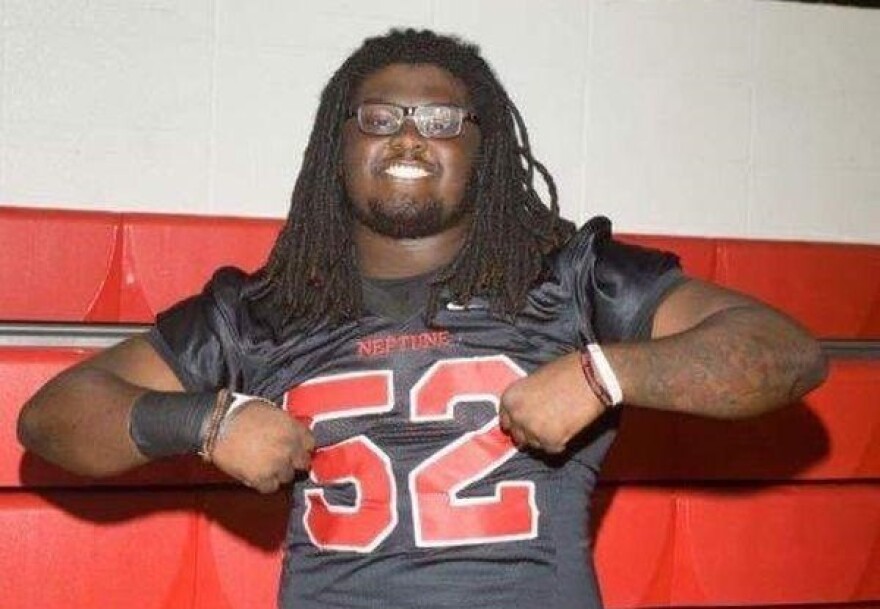One year ago a 19-year-old football player from New Jersey arrived in western Kansas to start his dream of playing in the pros. But after just one practice Braeden Bradforth was dead of exertional heatstroke, leaving his family devastated and Garden City Community College (GCCC) to explain how it happened.
“It's like nobody wasn't looking out for him,” said Joanne Atkins-Ingram, Bradforth's mother.
Since the death, the school has made changes aimed at improving player health and safety, hiring two more trainers and a conditioning coach. It also conducted an internal investigation.
GCCC is also paying $100,000 for an external investigation into the teen's death.
Unanswered questions
For the first time in almost a year, top GCCC officials have spoken on the record about Bradforth's death. That includes former head coach Jeff Sims, who left after the 2018 season to take the head coaching job at Missouri Southern University in Joplin.
“It’s unfortunate what happened, but God has a plan," Sims told KCUR during football media day for the Mid-America Intercollegiate Athletic Conference (MIAA) in Kansas City. Similar to earlier comments, Sims insisted Bradforth's death was not his fault but instead an act of God. "We’ve had two investigations, and everybody knows what happened that day. It didn’t happen at football practice; it happened after football practice,” he said.

Bradforth's death did occur after the practice ended, but KCUR discovered that Bradforth ran 36, 50-yard sprints on his first day of practice at a higher altitude than his hometown.
One expert in sports medicine called it a “do-or-die” drill.
Teammates found Bradforth slumped against an outside dorm wall after practice.
Emails obtained by the Associated Press said the youngster was “making a stressful moan” when an assistant coach arrived on the scene. An emergency medical service report stated 25 minutes passed before paramedics were called.
Multiple players told KCUR and other media that Sims refused to let players drink during practice.
Echoing the internal investigation, Sims said that there were "60 gallons of water available," but he wouldn't say when he allowed players to get a drink of water.
While Sims suggests that people know what happened the day Bradforth died, GCCC is still trying to answer questions surrounding his death. The school did an internal investigation but refused to release the full report. GCCC did release a page-and-a-half summary of the investigation. However, the summary did not contain a list of witnesses, though it appears only coaches and the head trainer were interviewed. It also did not hold anyone accountable for the death.
The law firm hired by GCCC is now in the middle of its investigation, which the school agreed to only after intense pressure from the entire New Jersey U.S. House delegation and Bradforth’s mother.
GCCC President Ryan Ruda, a GCCC vice president at the time of Bradforth's death, would not commit to releasing the entire report when KCUR caught up with him at a board of trustee's meeting last month in Garden City. "I definitely want to lean on our legal counsel there, just to help with kind of navigating the waters into and verifying exactly what is within our realm and what can be released," he said.
Sims confirmed that he will cooperate with the outside law firm GCCC hired to investigate Bradforth's death.
Dangerous practices
The exertional heatstroke death of Bradforth is one of a string of heat-related deaths in college and high school football. A paper just released by the American Orthopaedic Society for Sports Medicine concluded conditioning is far more dangerous than the actual games.

"What we found in our study was that most of these fatalities were caused by overexertion and there was a lack of exercise science with these exercise programs and conditioning sessions," said Dr. Barry Boden, the study's lead author.
He said the number of traumatic football injuries has plummeted since the 1960s but non-traumatic deaths have stayed the same.
Since 2000, at least 30 football players have died from workouts, according to HBO’s Real Sports.
Greg McVey, hired as athletic director at GCCC in April, said the school will not work players so hard that they are in danger. “I can assure you, from my leadership, we will ensure that everybody we put on that field is sound enough to be out there,” he told KCUR at the trustees meeting.
On the anniversary of his death, August 1, many community members from Bradforth's hometown of Neptune, New Jersey, plan to gather on the Pop Warner field where he played as a boy to remember someone many referred to as a gentle giant.
Atkins-Ingram has said every day is a struggle for her since her youngest son died. But she will be on that football field with many of her friends and lots of the kids Bradforth played football with. “I know that he's given me the strength to do this," she said. "I know he's looking down saying, you know, you can do this, you have to do this because nobody else should suffer. Not another parent or kid.”
Sam Zeff is KCUR's metro reporter. You can follow Sam on Twitter @samzeff.




